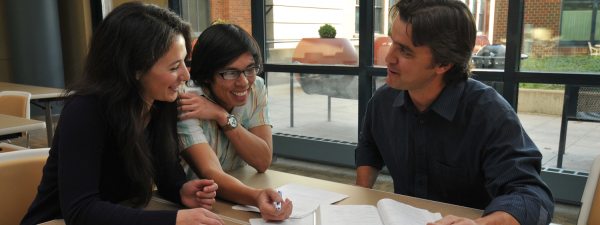Overview
The economics major provides flexibility and opportunity and can take you in many directions, both inside and outside of the field of economics. In fact, most economics majors do not work as economists, but in business careers of all varieties. The analytical and quantitative skills that one acquires as an economics major are much in demand in the job market and are also highly attractive to law schools and MBA programs. Whatever your career plans, economics training can give you the edge you need to further your long-term goals.
Trained economists are employed by private businesses, banks, law firms, consulting firms, international corporations and agencies, public utilities, federal and local governments, and colleges and universities. Economists who work in the private sector spend much of their time using the tools of economics to analyze issues that are important to their employers. For instance, these economists might be called upon to forecast the demand for the company's product, to perform cost-benefit or optimal pricing analyses for potential projects, or to analyze the effects of government regulations on the company.
 Economists are also employed in many government agencies. These agencies use economists to forecast the effects of various policy proposals on the economy or to analyze the effects of policies that have already been enacted. These economists study issues such as the effects of government regulations on industries, the fairness and impacts of taxes, the effects of various policy tools in fighting inflation and unemployment, the causes of poverty and the plight of the homeless, pollution, crime, and other social policy issues.
Economists are also employed in many government agencies. These agencies use economists to forecast the effects of various policy proposals on the economy or to analyze the effects of policies that have already been enacted. These economists study issues such as the effects of government regulations on industries, the fairness and impacts of taxes, the effects of various policy tools in fighting inflation and unemployment, the causes of poverty and the plight of the homeless, pollution, crime, and other social policy issues.
Economists employed by colleges and universities are teachers and researchers. In addition to teaching, these economists spend a great deal of time doing research, usually for publication in professional journals or for private and government grant projects.
Some of these positions require a BA in economics, while others require an advanced degree. Salaries at all levels are very competitive and can be researched in the latest Occupational Outlook Handbook in the library or in the Career Counseling Center.
The BA program in economics provides training in basic economic theory, the use of statistical techniques to analyze economic phenomena, and more specific fields within economics, such as labor economics, international trade, developing and transitional economies, and money and banking. Economics majors from CU Denver have recently gone on to prestigious positions at companies such as Qwest, Merck Pharmaceuticals, Citicorp and Lockheed Martin, and to graduate schools at universities such as Harvard, Stanford, University of Chicago, University of Rochester, and Columbia.
The Economics Department at CU Denver is comprised of energetic, internationally recognized scholars who are publishing their cutting-edge research in prominent academic journals. In addition to their scientific publications, CU Denver economics professors have a direct impact on policy through avenues such as consulting for members of the US Congress and various branches of the Colorado state government, conducting federally funded policy-oriented research, and participating in local and national conferences and seminars. This research activity of the department allows the students to gain exposure to knowledge and tools at the frontiers of economic analysis. In addition, students receive the most up-to-date information and the latest analysis of such topics as taxation, the effectiveness of poverty programs, international trade and finance, economic foreign policy, the consequences of government intervention in the economy, the economic analysis of race and sex discrimination, and many other contemporary topics. Research publications of CU Denver professors can be found on faculty member's profiles.
Faculty are accessible and friendly, and the department provides plenty of opportunity to receive "hands-on" experience and training in the field of economics. They include teaching and research assistantships in the department, and internships under the guidance of the department. There are also opportunities to take economics classes at our campus overseas. Currently, students can take economics classes in Beijing, and receive full credit toward their major and CLAS requirements.
Learning Outcomes
- To be able to apply the general concepts learned from economic theory and methods to specific fields of economics.
- To be able to articulate an economic hypotheses and interpret econometric tests of the hypothesis.
- To be able to explain and evaluate the relevant benefits and costs to consider when comparing decision options and policy choices.
- To be able to communicate, in written form, basic economic theories, concepts, analytical methods, and policy choices.
